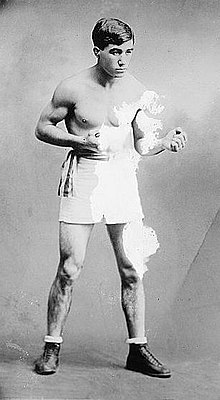Johnny Dundee
Johnny Dundee | |
|---|---|
 | |
| Born | Giuseppe Carrora November 19, 1893 [[Sciacca], [Sicily]], Italy |
| Died | April 22, 1965 |
| Nationality | |
| Other names | Scotch Wop |
| Statistics | |
| Weight(s) | Lightweight |
| Stance | Orthodox |
| Boxing record | |
| Total fights | 343 |
| Wins | 183 |
| Wins by KO | 22 |
| Losses | 64 |
| Draws | 39 |
Johnny Dundee (b. November 22, 1893, d. April 22, 1965) was a featherweight and junior lightweight boxer who fought from 1910 until 1932. Dundee was born Giuseppe Carrora in Sciacca, Sicily, but was raised in the United States.
Known as the Scotch Wop, Dundee faced all of the great fighters in the featherweight, lightweight and junior-lightweight divisions of his era. He fought the great Benny Leonard nine times, and Lew Tendler three times. He also boxed lightweight champions Freddy Welsh and Willie Ritchie.
Dundee was regarded as a skillful boxer with great footwork. He fought 330 bouts, third in ring history, and won the featherweight and junior lightweight world titles. Dundee was knocked out only twice in his career. His final record was 194 wins (22 KOs), 60 losses and 41 draws. The remaining bouts were No Decisions, which were common during the era in which he fought.
He received his first opportunity to win a world title in his 87th fight, in 1913. Although he fought the champion, Johnny Kilbane, to a draw, he would not receive another shot at a title until 1921. By this time he had fought an astounding 264 fights. He won the title when his opponent, George "KO" Chaney, was disqualified in the fifth round. Dundee thus became the first universally recognized world junior lightweight champion in ring history.
In 1923 he also unified the world featherweight championship by defeating Eugene Criqui of France.
Jack Bernstein won the World Junior Lightweight Championship on May 30, 1923 from titleholder Dundee in New York City’s Velodrome in a unanimous 15-round decision. Dundee won it back on December 17 that same year in a 15-round decision in Madison Square Garden. In their return bout Bernstein again dominated Dundee. Some media called the decision for Dundee “outrageous,” “putrid,” and “a heist.” Time Magazine wrote: "... the crowd hooted. The fans and the journalists watching could credit Dundee with at most only three victorious rounds, the last three, and possibly two other rounds drawn. The judges brought in a decision favoring Dundee. There was blank astonishment. Then a chorus of hoots and denunciations shook the building." Another critic, Wilbur Wood, wrote: "It will be many a year before the memory of the decision handed down in the Bernstein-Dundee fight can be softened down sufficiently to prevent sportsman from undergoing an attack of nausea when it is called to mind." And the New York Times reported: "The decision shocked a crowd of 13,589 persons."[1] The two fought a “rubber” third match 10 months later, on September 15, 1924, 3 months after Dundee lost his Junior Lightweight title. This time the 15-round decision went unanimously to Bernstein.
Unable to make the weight he relinquished the featherweight crown in 1924.
Although today he is almost completely forgotten, Dundee was highly regarded by many old time boxing experts. Ring Magazine founder and editor, Nat Fleischer, rated Dundee in the top five of his list of greatest featherweights of all time.[citation needed]
References
- Boxing record for Johnny Dundee from BoxRec (registration required)
